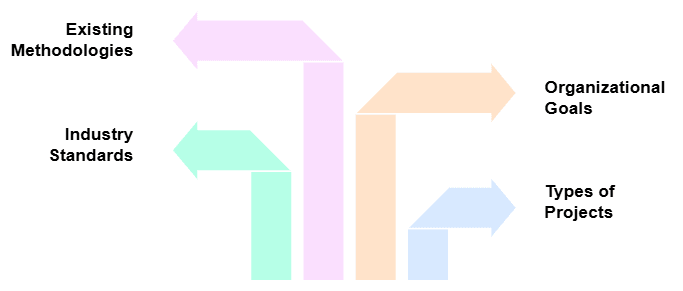PMP Certification Training
- 86k Enrolled Learners
- Weekend/Weekday
- Live Class
In the fast-paced area of project management, professionals often look for certifications to help them get better jobs and improve their skills. PRINCE2 and APM are two well-known titles in this field. It is important to know the differences, benefits, and possible synergies between these certifications in order to make smart choices about your career growth.
To navigate the complexities of project management certifications, it’s essentnial to understand the specifics of each option. Let’s begin by exploring the PRINCE2 certification in detail.
PRINCE2, which stands for “Projects IN Controlled Environments,” is a structured project management methodology recognized and utilized worldwide across various industries. Developed in the UK, it employs a process-based approach that emphasizes organization and control throughout a project’s lifecycle. It stresses organization and control throughout the lifecycle of a project. There are two general levels of certification:
Foundation: This course explains the principles, themes, and methods so that you can understand the methodology.
Practitioner: This course tests your ability to handle projects using the PRINCE2 framework by having you apply the principles to real-life situations.
Having established a clear understanding of PRINCE2, it’s equally important to examine the APM certification to appreciate its unique features and how it complements PRINCE2.
The Association for Project Management (APM) offers certifications that help individuals develop and demonstrate their project management competencies. The APM Project Management Qualification (PMQ), formerly known as APMP, is a comprehensive certification covering various aspects of project management, including planning, risk management, communication, and teamwork. Unlike PRINCE2, APM emphasizes a broader understanding of project management principles and practices.
The APM PMQ is ideal for professionals seeking to deepen their knowledge of project management and apply best practices across different frameworks and methodologies.
With insights into both PRINCE2 and APM certifications, let’s delve into the specific benefits that PRINCE2 offers to project management professionals.
Obtaining a PRINCE2 certification offers several advantages:
Global Recognition: Its is recognized worldwide, enhancing job opportunities internationally.
Structured Approach: Provides a clear, step-by-step methodology applicable to various projects, ensuring consistency and control.
Scalability: Adaptable to projects of any size or complexity, offering flexibility in application.
Higher Project Success Rates: Emphasizes thorough planning, risk management, and defined roles, contributing to improved project outcomes.
Understanding the advantages of PRINCE2 sets the stage for a comparative look at the benefits provided by APM certification.
Pursuing an APM certification also offers numerous benefits:
Comprehensive Knowledge: Covers a wide range of project management topics, providing a holistic view of the discipline.
Versatility: Not confined to a single methodology, allowing professionals to adapt their skills to various project environments.
Professional Recognition: Demonstrates commitment to the profession and adherence to established standards.
Foundation for Further Development: Serves as a stepping stone for advanced certifications and specialized areas within project management.
With a grasp of the benefits each certification offers individually, it’s time to compare APM and PRINCE2 directly to highlight their differences and similarities.
When comparing APM and PRINCE2, consider their purposes and applications:
PRINCE2 is a specific project management methodology, whereas APM encompasses a body of knowledge covering various concepts and practices.
PRINCE2 is process-oriented, focusing on the “how” of managing projects. In contrast, APM emphasizes the “what” and “why,” fostering a deeper understanding of project management principles.
APM principles can integrate with various methodologies, including PRINCE2, offering versatility. PRINCE2 provides a structured framework that can be tailored to specific project needs.
Recognizing the distinct strengths of both certifications, there are compelling reasons why obtaining both APM and PRINCE2 can be advantageous for a project management professional.
Pursuing both certifications concurrently can be highly beneficial:

Understanding both the methodology (PRINCE2) and the broader principles (APM) equips professionals with a comprehensive skill set.
Holding both certifications showcases versatility and a commitment to professional development, making candidates more attractive to employers.
Combined knowledge enables professionals to seamlessly adapt to diverse project environments and requirements.
While pursuing both certifications can be beneficial, it’s crucial to consider organizational factors that influence which certification aligns best with specific business needs.
When selecting the certification that best aligns with your organization’s needs, consider the following:

PRINCE2 may be more suitable for organizations requiring a structured approach to project management. APM could be advantageous for those seeking a broader understanding of project management principles.
Certain industries may prefer or recognize one certification over the other.
Aligning the certification with the company’s long-term objectives and project management approach is vital.
The organization’s current project management practices may influence the choice of certification.
After examining the individual and combined merits of APM and PRINCE2 certifications, we can conclude to guide professionals in their certification journey.
Professionals in project management can learn a lot from both the PRINCE2 and APM certifications. It’s important to understand the differences between them and evaluate the benefits of each before deciding which aligns best with your career goals and organizational needs. For instance, those interested in structured, process-driven frameworks may find value in exploring the PRINCE2 methodology further—courses like Edureka’s PRINCE2 Foundation and Practitioner training provide an accessible starting point. Getting both certifications can often give you a solid base that makes you more marketable and flexible in the competitive field of project management.
 Thank you for registering Join Edureka Meetup community for 100+ Free Webinars each month JOIN MEETUP GROUP
Thank you for registering Join Edureka Meetup community for 100+ Free Webinars each month JOIN MEETUP GROUPedureka.co